Joshua and Judges: Destruction of Jericho; significance of the method, part 2. Jos 6:20-27; 2Pe 2:3-13; Psa 73.
length: 61:31 - taught on Dec, 3 2015
Class Outline:
Title: Joshua and Judges: Destruction of Jericho; significance of the method, part 2. JOS 6:20-27; 2PE 2:3-13; Psa 73.
Announcements / opening prayer:

This actually makes a headline in our nation. Sad. Instead of invoking prayer tragedy opens up the opportunity to mock it. Prayer works. I believe it works. And if we were a prayerful people, we would be a better people, and if we were a better people, we’d be a better nation.
JOS 6:20 So the people shouted, and priests blew the trumpets; and it came about, when the people heard the sound of the trumpet, that the people shouted with a great shout and the wall fell down flat, so that the people went up into the city, every man straight ahead, and they took the city.
JOS 6:21 And they utterly destroyed everything in the city, both man and woman, young and old, and ox and sheep and donkey, with the edge of the sword.
Last night we saw the significance of the shofar, which was a ram's horn blast indicating a celebration of God's deliverance of His people. Now we shall look at the aspect of the seven days.
The manner of the seven days:
Destruction of God's enemies will not be all at once but after a long conflict, and it shows the enemy that no matter how long they sustain their opposition, they will be destroyed in a moment.
In this way He not only showed to His congregation that it would not be all at once, but only after long-continued conflict, and at the end of the world, that the worldly power by which it was opposed would be overthrown, but also proved to the enemies of His kingdom, that however long their power might sustain itself in opposition to the kingdom of God, it would at last be destroyed in a moment.
God could have destroyed the walls in a day, but seven days refers to God's perfect timing of completion. It may seem like the world will go on as it is forever and never be judged, but it will be judged in God's perfect timing. It may happen in our lifetime or it may be another thousand years away, but when it comes, it will come swiftly.
2PE 3:3 Know this first of all, that in the last days mockers will come with their mocking, following after their own lusts,
2PE 3:4 and saying, "Where is the promise of His coming? For ever since the fathers fell asleep, all continues just as it was from the beginning of creation."
2PE 3:5 For when they maintain this, it escapes their notice that by the word of God the heavens existed long ago and the earth was formed out of water and by water,
2PE 3:6 through which the world at that time was destroyed, being flooded with water [sudden].
2PE 3:7 But the present heavens and earth by His word are being reserved for fire, kept for the day of judgment and destruction of ungodly men.
2PE 3:8 But do not let this one fact escape your notice, beloved, that with the Lord one day is as a thousand years, and a thousand years as one day.
2PE 3:9 The Lord is not slow about His promise, as some count slowness, but is patient toward you, not wishing for any to perish but for all to come to repentance.
2PE 3:10 But the day of the Lord will come like a thief, in which the heavens will pass away with a roar and the elements will be destroyed with intense heat, and the earth and its works will be burned up.
2PE 3:11 Since all these things are to be destroyed in this way, what sort of people ought you to be in holy conduct and godliness,
2PE 3:12 looking for and hastening the coming of the day of God, on account of which the heavens will be destroyed by burning, and the elements will melt with intense heat!
2PE 3:13 But according to His promise we are looking for new heavens and a new earth, in which righteousness dwells.
It is easy to become frustrated at the very apparent fact that the wicked continue to prosper and those that follow the Lord often suffer loss. The believer must view the finish of all things.
PSA 73:1 Surely God is good to Israel, To those who are pure in heart!
PSA 73:2 But as for me, my feet came close to stumbling; My steps had almost slipped.
PSA 73:3 For I was envious of the arrogant, As I saw the prosperity of the wicked.
PSA 73:4 For there are no pains in their death; And their body is fat.
PSA 73:5 They are not in trouble as other men; Nor are they plagued like mankind.
PSA 73:6 Therefore pride is their necklace; The garment of violence covers them.
PSA 73:7 Their eye bulges from fatness; The imaginations of their heart run riot.
PSA 73:8 They mock, and wickedly speak of oppression; They speak from on high.
PSA 73:9 They have set their mouth against the heavens, And their tongue parades through the earth.
PSA 73:10 Therefore his people return to this place; And waters of abundance are drunk by them.
PSA 73:11 And they say, "How does God know? And is there knowledge with the Most High?"
PSA 73:12 Behold, these are the wicked; And always at ease, they have increased in wealth.
PSA 73:13 Surely in vain I have kept my heart pure, And washed my hands in innocence;
PSA 73:14 For I have been stricken all day long, And chastened every morning.
PSA 73:15 If I had said, "I will speak thus," Behold, I should have betrayed the generation of Your children.
The poet is saying that if he had made up his mind to have the same course of reasoning, i.e. if he spoke as they do, then he would have faithlessly forsaken the fellowship of the children of God, and should consequently also have forfeited their blessings.
PSA 73:16 When I pondered to understand this, It was troublesome in my sight
PSA 73:17 Until I came into the sanctuary of God; Then I perceived their end.
PSA 73:18 Surely You do set them in slippery places; You do cast them down to destruction.
PSA 73:19 How they are destroyed in a moment! They are utterly swept away by sudden terrors!
Sudden and in a moment sound very Jericho-like.
PSA 73:20 Like a dream when one awakes, O Lord, when aroused, You will despise their form.
PSA 73:21 When my heart was embittered, And I was pierced within,
PSA 73:22 Then I was senseless and ignorant; I was like a beast before You.
Cognizance of God's immutable judgment will change a faithful heart from being embittered to being at perfect peace.
PSA 73:23 Nevertheless I am continually with You; You have taken hold of my right hand.
PSA 73:24 With Your counsel You will guide me, And afterward receive me to glory.
PSA 73:25 Who have I in heaven but You? And besides You, I desire nothing on earth.
PSA 73:26 My flesh and my heart may fail, But God is the strength of my heart and my portion forever.
PSA 73:27 For, behold, those who are far from You will perish; You have destroyed all those who are unfaithful to You.
PSA 73:28 But as for me, the nearness of God is my good; I have made the Lord God my refuge, That I may tell of all Your works.
[back to]
JOS 6:22 And Joshua said to the two men who had spied out the land, "Go into the harlot's house and bring the woman and all she has out of there, as you have sworn to her."
JOS 6:23 So the young men who were spies went in and brought out Rahab and her father and her mother and her brothers and all she had; they also brought out all her relatives, and placed them outside the camp of Israel.
We cannot tell what happened to Rahab's house when the wall fell since her house was on the wall. The house could not have been destroyed since they were instructed to stay in it. Therefore, in some manner, God spared her house so that the two spies could return and take her and her family out safely.
The faithful are always delivered in the perfect timing of God. Rahab had no idea it would take seven days, but she waited and was delivered.
JOS 6:24 And they burned the city with fire, and all that was in it. Only the silver and gold and articles of bronze and iron, they put into the treasury of the house of the Lord.
JOS 6:25 However, Rahab the harlot and her father's household and all she had, Joshua spared; and she has lived in the midst of Israel to this day, for she hid the messengers whom Joshua sent to spy out Jericho.
After man and beast had been put to death, and Rahab and her relatives had been placed in security, the Israelites set the town on fire with everything in it, excepting the metals, which were taken to the treasury of the tabernacle, as had been commanded in v. 19.
On the conquest of the other towns of Canaan the cattle and the booty fell to the conquerors, while only the inhabitants were put to death. So then it was just the people who were put under the ban.
In the case of Jericho, being the first town taken and so being the first fruits that were thus sanctified to the Lord, all were put under the ban.
In the case of Jericho, on the contrary, men, cattle, and booty were all put under the ban, and the town itself was to be laid in ashes. This was because Jericho was the first town of Canaan which the Lord had given up to His people. Israel was therefore to sacrifice it to the Lord as the first-fruits of the land, and to sanctify it to Him as a thing placed under the ban, for a sign that they had received the whole land as an inheritance from his hand, and had no wish to grasp as a prey that which belonged to the Lord.
The fact that the historian states in verse 25 that Rahab was still alive with the people of Israel, wife of Salmon, shows us that the book was written not very long after the finish of the conquest, seven years from the time that she was delivered.
and to Salmon was born Boaz by Rahab; and to Boaz was born Obed by Ruth; and to Obed, Jesse; and to Jesse was born David the king.
Rahab married Salmon, the tribe prince of Judah, to whom she bore Boaz, an ancestor of David and therefore of Jesus Christ.
JOS 6:26 Then Joshua made them take an oath at that time, saying, "Cursed before the Lord is the man who rises up and builds this city Jericho; with the loss of his first-born he shall lay its foundation, and with the loss of his youngest son he shall set up its gates."
Because the city is completely under the ban as sanctified unto the Lord, nothing was to be built upon this site, and surely enough, nothing ever was. This is what makes the archeology of the site much easier than most and most interesting. Most cities that were destroyed or abandoned were built up again on top of the ruins of the old city, but not so with Jericho.
No other fortified town was ever to be built upon this site in order to make the destruction of it a memorial to posterity of the justice of God sanctifying itself upon the ungodly.
God did not ban anyone from living in the area. The area was given to the Benjamites to inhabit, but that there should never again be a city with a city wall having gates.
Later, in the time of Ahab's kingship, a man name Hiel attempted to defy the curse and build a city upon the ruins of Jericho.
1KI 16:33 Thus Ahab [seventh king of Israel, around 860 BC] did more to provoke the Lord God of Israel than all the kings of Israel who were before him.
1KI 16:34 In his days Hiel the Bethelite built Jericho; he laid its foundations with the loss of Abiram his first-born, and set up its gates with the loss of his youngest son Segub, according to the word of the Lord, which He spoke by Joshua the son of Nun.
JOS 6:27 So the Lord was with Joshua, and his fame was in all the land.
Archeological evidence.
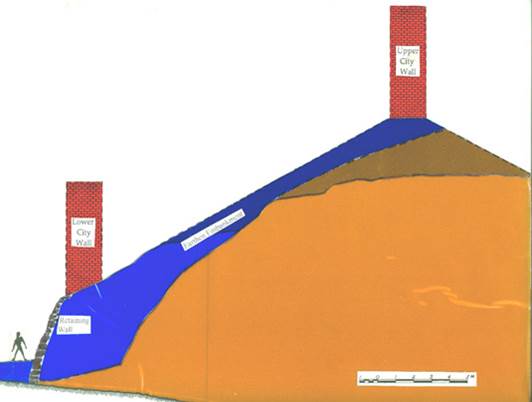
Excavation of the city, which has been performed several times since 1900, show a retaining wall that once had a mud brick wall built on top of it. Various domestic structures were built behind this first or lower city brick wall and then sloping upward from those structures was a second brick wall or upper city wall.
The city as a whole looked something like this.
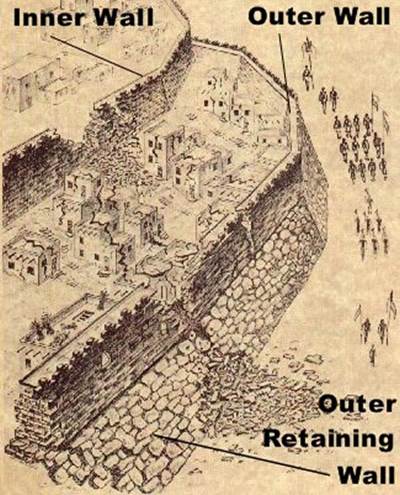
The excavation around the lower retaining wall found a sloping pile of mud bricks. The next photo is an actual drawing by the lead archeologist during the dig of the 1950's.
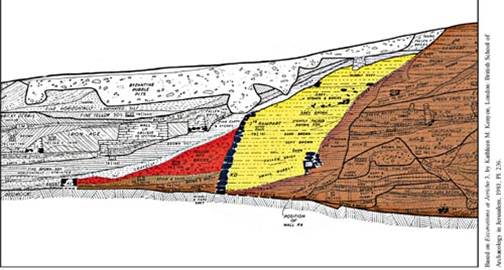
The Israelites would have run up this ramp composed of the fallen lower city wall and up the hill into the outer and inner part of the city.
Then there is the evidence of the fire and the jars filled with grain.
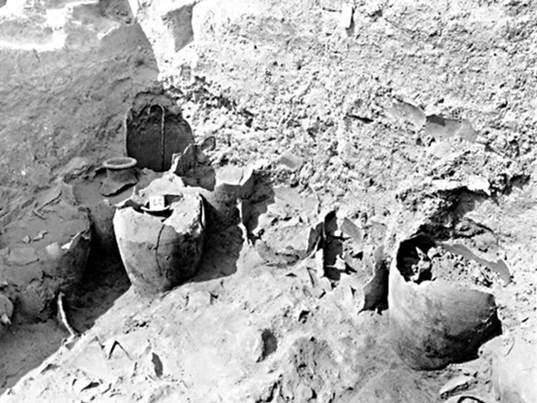
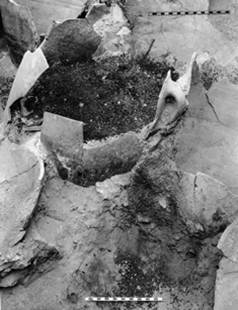
During excavation there was found a burned layer as well as pots filled with grain that was burned.
The fact that the pots were mostly full of grain tells us that it was harvest time which for that area is spring time, which agrees with the Biblical account. The fact that the grain had not been eaten shows us that the siege of the city did not take a long time. With everyone shut up in the city, a long siege would have caused the people to eat up their storehouses of grain. The fact that the pots were full and the grain was burned tells us that the destruction was very quick and that the city was burned with fire. Grain was valuable. The burned grain also shows us that Israel obeyed the Lord and did not take any of the grain.
Archeological evidence shows that no other city was built upon the layer of destruction. No other fortified city was ever built there, as God determined and with that, all the archeological evidence fits with the Biblical account. To see more bYrSkikZhxIdetail about these findings as well as the ways in which many archeologists reject the Biblical account you can watch an informative program at the following you tube address:





